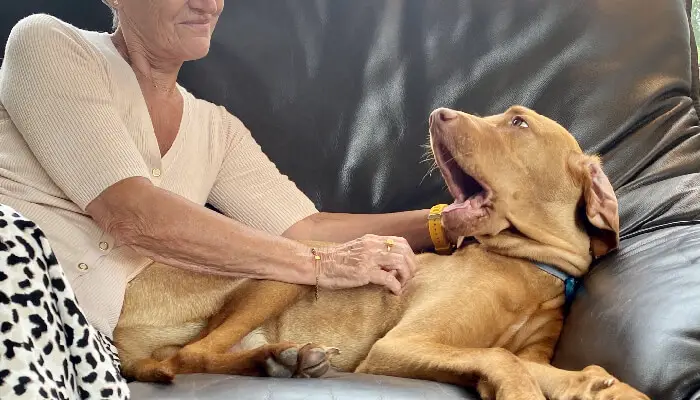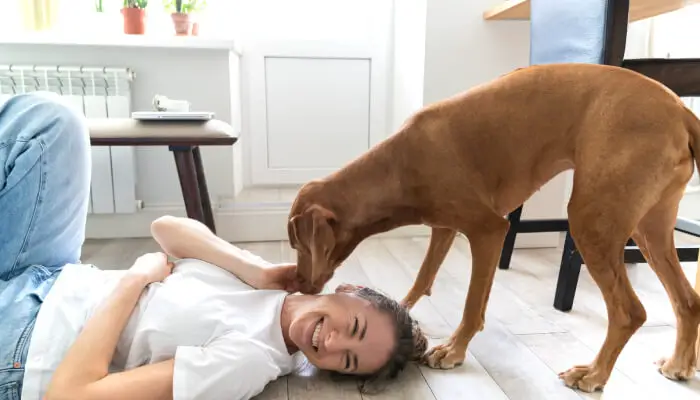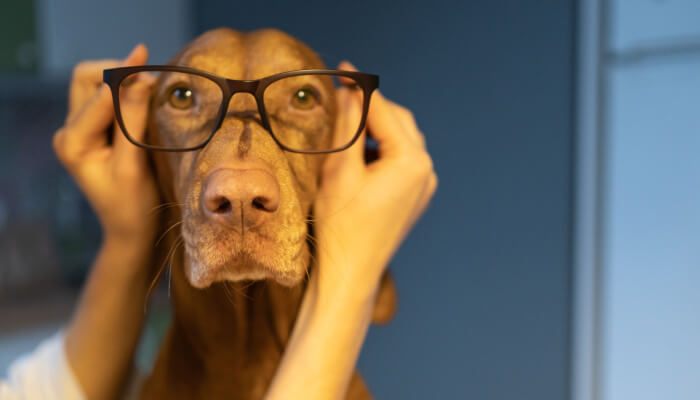Vizsla is a breed of dog that was originally bred in Hungary for hunting. They are known to be intelligent, obedient, and beautiful dogs with an excellent lineage. However, they have been prone to itching due to their thick undercoat that often needs grooming and even clipping from time to time. But what are the causes of itching in Vizsla?
Vizsla itching happens when a dog is allergic to certain substances. There are many potential allergens, including food items, plants, and other animals. Allergic dermatitis or contact dermatitis can also cause itchy skin in dogs and contact with chemical irritants such as soaps, detergents, perfumes, etc.
Some dogs are also allergic to certain materials such as wool, nylon, or spandex. Dogs can also exhibit itching behavior due to skin conditions like mange and yeast infections resulting in intense scratching leading to secondary bacterial infection of the skin surface.
Owners need to know what can cause their dogs’ itchiness so they can prevent them from developing allergies or maintain good hygiene standards at home.
This article will talk about various reasons why Vizslas are prone to itching. In addition, I will also address the causes and prevention of itchy skin in the Vizslas.
Vizsla Itching
The Vizsla is a breed of hunting dog in Hungary. They are intelligent, obedient, and beautiful dogs with an excellent lineage. However, they have been prone to itching due to their susceptible skin.
Vizsla Itching is a common problem that arises due to fleas, allergies, or other irritants. If you notice any signs of itching on your dog, there should be some steps taken to eliminate whatever it is that’s causing the itchiness. The most important thing for getting rid of itching in dogs is figuring out the cause.
Why Is Vizsla Itching?
The thick and soft undercoat of the Vizslas makes them prone to itching. In addition, the dog’s natural oil produced by their skin can get trapped in this coat, which may lead to excessive itchiness or even hair loss if not properly groomed. This breed also needs adequate exercise with a consistent amount of companionship to keep their minds stimulated.
The causes of dog itching are many and varied, but they typically fall into one of three categories: allergic reactions, parasitic infestation, and over-stimulation.
Allergic Reactions
Allergic reactions in dogs are usually a response to harmful substances they come into contact with, both indoors and out. These can be environmental allergens such as pollen or mold spores, household items like cleaning supplies or laundry detergents, food products containing ingredients your dog is allergic to (like beef), even flea bites. The reaction can either be localized to one area of the body or affect multiple locations.
Parasitic Infestation
A parasitic infestation is another common cause of itchiness in dogs, and these are usually caused by flea bites, ear mites, scabies, or ringworm infection. Parasite-related itching will typically have a pattern: the dog may constantly scratch or bite one area of its body, making it raw and inflamed.
Over-Stimulation
Lastly, overstimulating the skin can lead to itchiness in dogs. It is a common occurrence when you are playing with your pet excessively (with too many roughhousing sessions) or if they have been out in the heat for too long.
An example of over-stimulation would be a dog with allergies that are playing outside on a hot day. The allergens will set off an allergic reaction, and then excessive play or running around can increase their temperature. In addition, it dramatically increases itchiness, which your pet may try to fix by licking away at their fur.
Causes Of Itching In Vizsla
Fleas can be a significant cause of itchiness in the Vizslas and should always be dealt with immediately upon seeing any signs present on your dog. Other reasons for itching may include allergies, food sensitivities, poor skin condition, irritation from sunlight, or too much exposure to water.
Fleas
Fleas are a common cause of itching in Vizslas. If you notice your dog scratching excessively or have seen fleas on the animal, then it is likely that fleas have infested them, and you need to treat it as soon as possible.
Allergies
Some dogs have allergies that cause itching and skin irritation. For example, if you notice your dog scratching excessively, licking its paws, or rubbing its face on the ground, then it may be a victim of allergies. In addition, food sensitivities, environmental allergens, or contact with various irritants such as flea bites, pollen, dust, or mold usually cause allergies.
Poor Skin Condition
If your Vizsla has a poor skin condition, they are likely to be scratching excessively to relieve themselves from the itchiness that their skin is causing. It may occur due to conditions such as parasites, bacteria, or yeast infections and should be taken care of by visiting with a veterinarian for treatment.
Irritation From Sunlight Or Too Much Exposure To Water
Exposure to sunlight or water may irritate your Vizsla’s skin, usually accompanied by excessive scratching. If you notice this, it should be taken care of right away with a topical ointment from the veterinarian and treatment for any underlying conditions such as parasites.
Atopy
Atopy is a skin condition that causes chronic itching. Allergies, flea bites, or other external factors such as dirt and dust mites cause Atopy in vizslas, leading to excessive itching.
Vizsla may develop an itch condition called AAtopy that is known for causing excessive licking, chewing, and scratching. In this condition, a dog becomes allergic to environmental substances such as pollen and molds resulting in intense itching of the skin.
Medications For Itching In Vizsla
The best way to get rid of itching in your Vizsla is by using a dog-safe moisturizing lotion or dish soap mixed with water on the affected areas. It also helps keep their skin hydrated and healthy, which can reduce these symptoms over time.
If your dog is suffering from excessive scratching and itching, then it might be time for some medication. The most common types of medicines used are antihistamines or corticosteroids. There has also been evidence that omega-three fatty acids.
There are many different medications available for the treatment of itchiness in dogs. These include over-the-counter medicines like topical ointments, antihistamines, and corticosteroids. In more severe cases of canine pruritus (itchiness), the veterinarian may prescribe oral or injectable medications that you can use for up to six months at a time.
Do not try and self-treat your dog’s itchy skin with over-the-counter medications, as these products can have detrimental side effects that may worsen their condition. Instead, consult a veterinarian to ensure you are following proper treatment for your pet based on the cause of itching in dogs.
Prevention Of Itching In Vizsla
Here are the preventive measures of itching in Vizsla:
Grooming
The best way to prevent your Vizsla from itching is by making sure that they stay groomed and well-groomed at all times. It will help keep their natural oils in balance, leading to minor irritation on the dog’s skin. The best grooming tool to use is a steel comb.
Grooming will also help prevent the spread of fleas and their eggs.
Proper Diet
The quality of your dog’s food can have an impact on how often they itch as well, so be sure to choose a high-quality brand that is low in salt content. If you are unsure about which foods would work best for your Vizsla, feel free to consult with a veterinarian.
Ensure that your dog is getting the proper nutrients and vitamins from their food by feeding them a high-quality diet. It will also help with dry skin, one of the causes of itching in Vizslas.
Give Them Enough Water
As mentioned before, keeping dogs hydrated can go a long way when it comes to preventing itching.
How To Help Vizsla With Itching?
If you do find that your dog starts to scratch and itches, then make sure they have access to plenty of freshwaters, so their coat stays damp for as long as possible. The best way to get rid of this itch-inducing dryness on their skin is by using a dog-safe moisturizing lotion.
Give Them Enough Attention
Dogs typically need a lot of love and attention, so make sure you give your Vizsla enough time to explore the new environment.
Provide Them With Toys And Puzzles
An excellent way to keep them entertained is by providing them with toys! Toys will help provide some distraction from their itching while also keeping them occupied for a while.
Give Them Enough Water
It would help if you also tried to keep them hydrated as much as possible. It will keep the coat damp and help prevent the itch.
Grooming Your Vizsla Regularly
Keeping your dog groomed will help keep their natural oils in balance, which often leads to minor irritation on the skin and a reduced risk of itching.
Can Itching Get Fatal For Vizsla?
The worst thing that could happen if your dog’s itching is getting fatal for them, but it doesn’t often go this far. The most common cause of death in a dog due to excessive scratching and biting is self-mutilation.
In most cases, itchy coats in vizslas will not get fatal. However, if the itchiness persists and there are no other underlying health problems that may be causing them to scratch themselves uncontrollably, it would be best to consult with a veterinarian.
Itchy dogs are more likely to scratch themselves, leading to sores and wounds on their body. That’s why you must consult with your veterinarian if your dog begins itching excessively for no apparent reason.
Conclusion
In conclusion, dogs are not always liable for the itching that they experience. Your vet will be able to recommend a suitable course of treatment depending on what is causing their itchiness.
This blog post has talked about Vizsla Itching and other related things like prevention, treatment, causes, etcetera.



